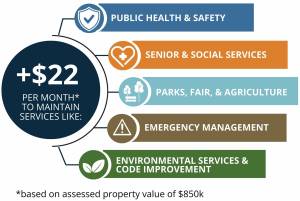Governor orders state to stockpile abortion pill
Published 1:30 am Saturday, April 15, 2023
By Alexandria Osborne
Washington State Journal
Thirty thousand doses of the pregnancy-ending drug mifepristone was purchased by the state under an order by Gov. Jay Inslee.
The abortion-related drug is legal in the state of Washington to end pregnancy up to 10 weeks. The drug was approved for use by the Federal Food and Drug Administration 20 years ago and studies show the drug is safe to use.
But, a judge in Texas is presiding over a case that challenges the FDA’s approval, and that could impact the ability of women in the state of Washington to have access to the drug, Inslee said.
“We are not sitting idly by while that threat exists,” Inslee said. “We recognize in Washington that the price of a woman’s freedom of choice is eternal vigilance.”
Rep. J.T. Wilcox, R-Yelm, said while people are concerned about a right to an abortion being stripped, the state of
Washington is not threatened.
“Abortion in Washington is established via a vote of the people. We don’t believe in overturning the will of the people, and we’re not making efforts to restrict access,” he said.
Wilcox said even though anti-abortion laws are being put into place, he is not concerned with abortion being restricted in Washington.
Nevertheless, Inslee said he directed the Washington State Department of Corrections to purchase a three-year supply of mifepristone That amounts to about 30,000 doses, he said. The total cost is $1.275 million, averaging at $42.50 per pill.
Inslee said he also asked the University of Washington to purchase a supply of the medication as well, and the university agreed and is now supplied with 10,000 doses, which creates about four years of backup of mifepristone.
If manufacturing of the drug comes to a halt after the court ruling, it will not have an impact on the supply because the decision would be to stop the manufacture, not the possession, he said.
“The purchase has been made, the shipment has arrived, it is in our possession and the department is appropriately maintaining that safe supply,” he said.
Inslee said the second step of this process is to authorize distribution of the medication to healthcare facilities and providers.
To move forward with the second step, Sen. Karen Keiser, D-Des Moines, filed a bill on April 4 authorizing the
Department of Corrections to acquire, sell, deliver, distribute and dispense abortion medication.
The bill, Senate Bill 5768, will be referred to the Ways and Means Committee immediately, Keiser said.
“Abortion rights and reproductive freedom means nothing without access,” she said. “If patients don’t have access, they might as well not have the legal right.”
Rep. Jessica Bateman, D-Olympia, said the Dobbs v. Jackson decision last year changed everything by overturning protections and rights to an abortion at a federal level.
The Supreme Court put the choice to reproductive care in jeopardy across the country, and Washington took action immediately, she said.
There have been multiple bills in the 2023 legislative session that protect individuals seeking abortions and healthcare providers in Washington from legal consequences outside of the state, she said.
“By taking this step today, we will ensure that Washingtonians can continue to access medication for abortion. We know that abortion is healthcare, and we believe that every person has the right to access abortion,” she said. “In
Washington, healthcare decisions should be made by a patient and their provider, not by a judge in Texas.”
Washington State Attorney General Bob Ferguson is leading 17 states in a lawsuit against the FDA to expand access to mifepristone.
“Pharmacies have to go through a special certification process in order to dispense it,” he said. “It’s our view that those restrictions are unlawful and unnecessary.”
Ferguson said attacks on reproductive rights will continue, and Washington leaders need to do what they can to
ensure people have a full range of reproductive freedom.
“That means adding thousands of this medication, make it accessible, that’s important,” he said. “If that means filing
a lawsuit against the FDA to expand access, that’s important, and we’ll continue taking these actions to make sure
that Washingtonians have the healthcare that they need, that they want and that they deserve.”





